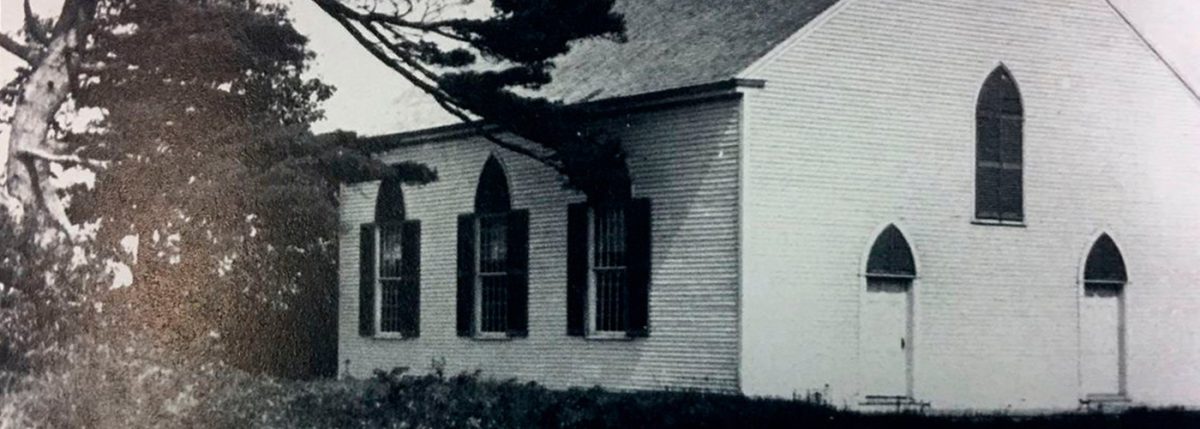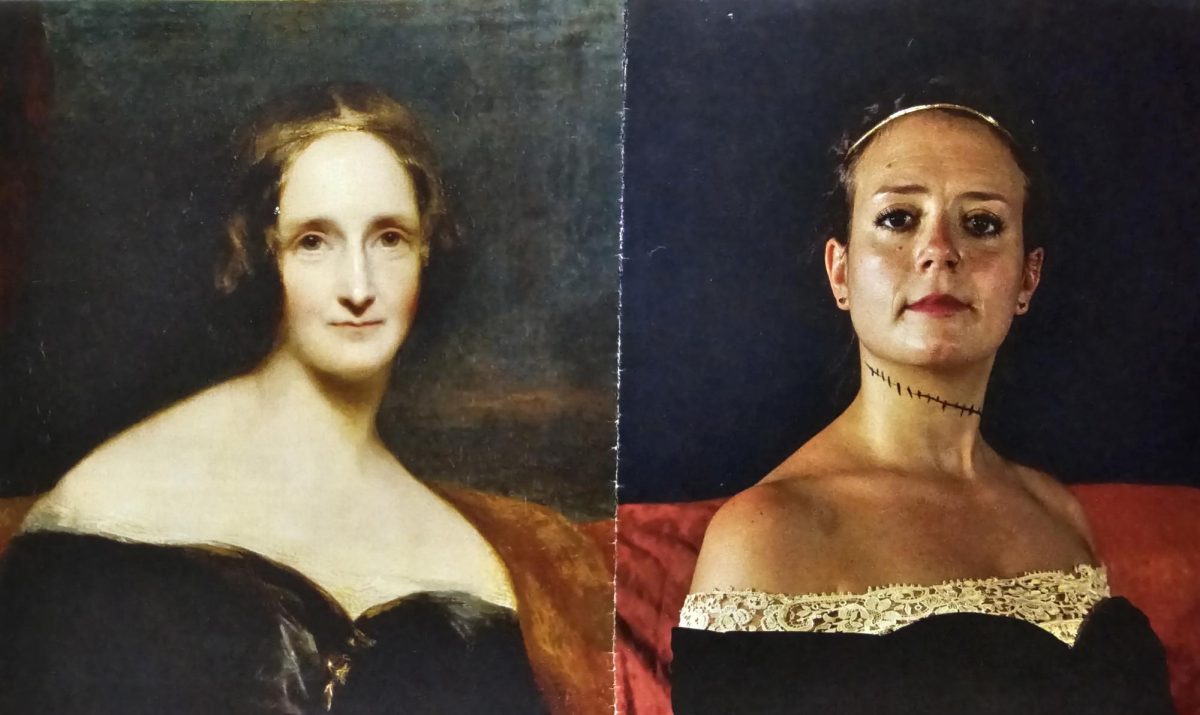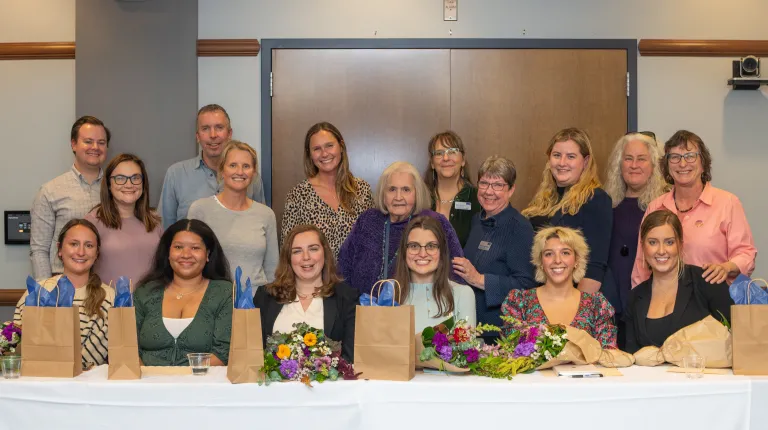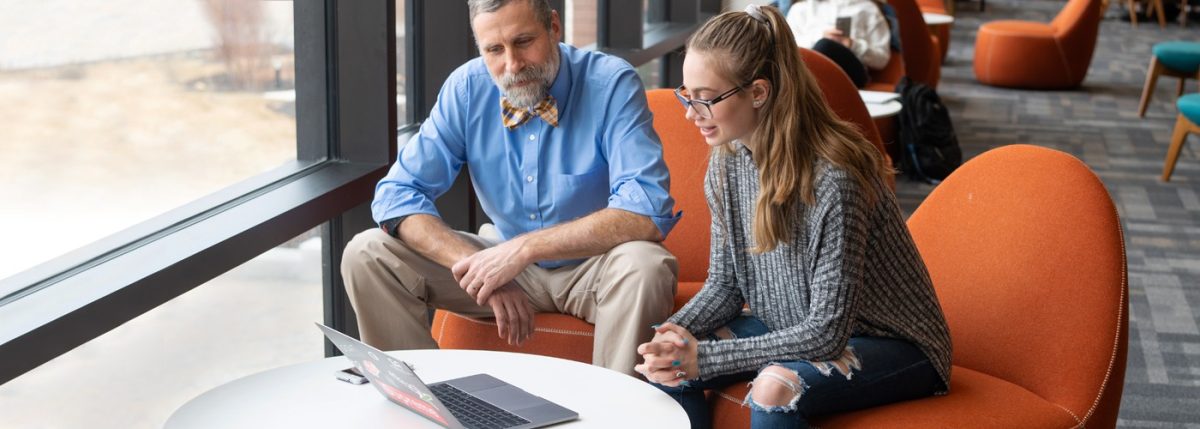Click Here to Listen:
Tempest is a student-run podcast that focuses on UNE’s School of Arts and Humanities on the Biddeford campus. Podcaster Chloe Boulle uses each episode to narrow in on topics including clubs, events, internship opportunities, extracurriculars, and the vibrant community that makes up UNE’s Biddeford campus.
Transcript (lightly edited for readability):
Chloe Boulle: We are in the First Parish Meeting House that stands on Meeting House Road here in Biddeford, Maine. There are three tight rows of wooden pews in the long rectangular room where professors, students, and historical society members sit and chat, waiting for the excitement to start. At the front of the high-ceilinged room, a long stage extends from one clean, cream-colored wall to the other. At its middle, short stairs lead to the highest point of the stage, a sort of podium or lectern, complete with a judge’s gavel that rests on its surface. Two young men, both in white shirts and tri-corner hats, step up to the podium, and the room falls silent.
Vivian Nunez: Hello. My name is Abigail Goldthwaite. My family and I have been Biddeford locals for the entirety of my life. I stand before you today with a heart weighted with concern and a voice filled with plea. In 1762, I married my husband, Captain Philip Goldthwaite, who was an officer of customs at Winter Harbor. Here, he regulates trade and enforces the taxation of goods once they arrive. During the past years, he and his fellow officers have met with nothing but hatred and resentment due to their loyalty to the crown. I fear that these instances are just a glimpse of life, shall we be tempted with the sour call of rebellion. As his wife, it is my duty to support my husband in any way possible that I can, whether it be managing our homestead or providing aid to those injured in these radical attempts at revolution. For this reason, I find it my responsibility to campaign for loyalty amoungst my community.
Elias Nawful: My name is Elias George Nawful. I’m a sophomore history major and bio minor, and I participated in the History 395, ‘What Really Happened’ class about different interpretations of the American Revolution, and it ultimately prepared us for a debate at the end of the semester.
Chloe Boulle: Every spring, the class Elias just mentioned, History 395, ‘What Really Happened?’ is offered. And, every spring, it is taught by a different professor on a different topic, such as the Salem witch trials, authoritarianism, or the American Revolution. Last spring, I got the opportunity to attend their end-of-semester debate and interview some of the students involved. I’ll let one of the students introduce himself to you. Kyle?
Kyle Lamarche: My name is Kyle Lamarche. You want, like, my major and stuff, too? I’m 30 years old, and I am a marine biology major.
Chloe Boulle: Awesome. So, who are you playing in the debate? Tell me a little bit more about them.
Kyle Lamarche: So, as we talked about a little bit on the walk over, I am playing Josiah Fairfield. I picked him because the only description I got about him is he was a doctor and then he was a merchant, which I thought was kind of interesting. And he essentially has little to no records of him and is basically a nobody. So we’re doing a lot of improv with him.
Chloe Boulle: What has research for that been like?
Kyle Lamarche: So when I say merchant, I found out after that it was equipping privateers, which meant I got to do a lot of research on 1700s sailors, which actually was, like, pretty illuminating, and I got some pretty sick stories in there. But, yeah. It’s mostly been kind of comparing, like, what economic statuses were for the people of the era, people of that position, and less so of, like, someone’s specific exploits.
Chloe Boulle: Mhmm. Are you gonna put, like, the fact that he’s a doctor into your speech?
Kyle Lamarche: So keep in mind the initial speech is only, like, three minutes. So it’s it’s not too crazy. I do a little spiel involving that. I decided to be like, ‘Oh, well, because of the embargoes against the British,’ and this is actually backed up in the, the reading that it was really hard to get medical supplies. So I’m like, ‘Oh, with the embargoes in the British, I watched people die in my arms that didn’t have to, and that just gave the fire in my belly to start a revolution.’ So I’m playing with it a little bit.
Chloe Boulle: That sounds like a lot of fun, actually. Sounds like it’s gonna be good to me.
Kyle Lamarche: I’m hoping. I’m hoping. Everyone’s put a lot of work into it, so…
Kyle Lamarche: I’m Josiah Fairfield. I was originally a doctor who changed my career to procure of desirable goods. I was a doctor during a period where, due to embargoes against the British, medicine was known to be hard to come by or expensive. I watched people lose their lives from curable illnesses as I helplessly lost patients without proper supplies or hope. But I stand all the same with our countrymen against the tyranny of Britain. I may not be a warrior myself, but I took the skills I had and took to the seas, keeping my brothers and sisters supplied in these troubling times. At least then, I could make a steady living while keeping valued currency out of the pockets of the Brits.
Chloe Boulle: Thank you for the fantastic speech, Kyle. But listening got me wondering. What other characters were involved in the debate, and how did they do their research? Well, do you remember Abigail Goldthswaite, who we heard give her speech a few moments ago? I talked with the student who played her, history major Vivian Nunez, to ask her about her character, Abigail, and what research was like.
Vivian Nunez: So, like, we talk about, mostly, the Massachusetts Bay Colony because we talked a lot about, like, Boston because that’s when, like, the monumental events happened. But we look at historical records and documents of just Biddeford. So, all the people in the debate are Biddeford residents at the time, which is why they’d be involved in the debate for the committee of correspondence. It was, like, a month or two into the semester. We were given the list of people that would be involved in the debate. And there was a few women, all of which were married to the husbands on the list. So I play Abigail Goldthwaite, who is also known as Abigail Dreyer prior to her marriage in, I believe, 1762 to Philip Goldthwaite. Philip was a captain, a boat captain, customs officer at Winter Harbor, worked there during the time that the debate is taking, which is 1774. So, yeah, he worked at Winter Harbor. Pretty much loyal to the crown.
So, like, my perspective when writing it or my ideas when writing it was she would keep the same point of view as her husband. Through my research, researching the women, a lot of them would follow their father’s beliefs, and then once they’re married off, they would adopt their husbands. So there’s little information about her. Most of the information about her was found through hyperlinks in her husband’s biographies, that led me to her name. So, a lot of my speech that I wrote was kind of taking, like, the general idea of, like, everyday women during the colonial time.
Like, it’s not specific to her. Whereas, like, the guys in the debate, like, the man the men who are in the debate, they’re looking at, like, records and published biographies of them. Their speeches are direct evidence of the people that they played.
Chloe Boulle: Vivian obviously did a great job with her research, as did the rest of the class. But this got me thinking. How did a class that culminates in a debate turn into a historical role play? And who better to ask than the course’s professor, doctor Jonathan DeCoster?
Dr. Jonathan DeCoster: As I was preparing to teach it this spring, I was simultaneously reaching out to the Biddeford Historical Society and just getting to know them and looking for any opportunity for collaboration. As I was talking to Paul McDonough, who’s the president of the Biddeford Historical Society, he told me how the Biddeford Meeting House, which the Historical Society owns and maintains, had been the site of this debate in 1774, where the town meeting got together to decide whether to join the boycott that was being proposed by Boston and, in retrospect, kind of start the process of joining the American Revolution. And once I learned about that event, I thought, well, that would be a perfect culminating event for this course. You’ve got the element of debate, you’ve got this very interesting local specific historical connection, we could actually take the students down to the literal site where that happened, and it just, it seemed great kind of in all these different ways.
Chloe Boulle: And how did the students feel about that?
Dr. Jonathan DeCoster: So I’ve done history courses in the past that had a heavy role-playing element. And I also know that for some students, those are the favorite courses they’ve ever had. And for some students, that’s very intimidating, especially if they didn’t know that’s what they were signing up for.
Chloe Boulle: Going in, did you know that it was gonna culminate in this, like, huge debate?
Kyle Lamarche: No. No. No. No. No. No. No. I thought once again, this is gonna be, like, just another history class, and I didn’t actually know this class in particular is actually, like, a required course for history majors. So it makes a little more sense that it, like, kinda turned into a thing. But it is funny to me that literally probably half, if not more than half, of the class are not history majors. So it’s it’s been an interesting contrast. But, no, I didn’t know it was going that way.
Dr. Jonathan DeCoster: For this particular course, a lot of the students are not history majors, and they they don’t even know what the subject of the course is going to be when they sign up for it. They definitely didn’t know that they were going to be debating in public, in front of an audience, etcetera. So I try to be very aware of that and really work with the students and let them help shape what the event was going to look like and try to figure out what their comfort level was gonna be for different kinds of things. So, we didn’t really decide until about two-thirds of the way through the semester that they thought it made sense for them to debate in character.
Chloe Boulle: And what did that decision look like? Vivian?
Vivian Nunez: It was like a group vote. There was certain people who were like, ‘Oh, I think it’d be beneficial for us to do it in first person so we can really get into it, and it’s not confusing.’ And then we also took into consideration, when people hear ‘debate,’ and we’re talking, history comes alive, what are they expecting? Are they expecting us to kinda read off of a paper, or do they want a performance of it? And so we decided on the performance of it. So that’s why you’re probably gonna see some of the guys wearing hats, and what are they called? Breeches, I think? The little- the pants. There’s been some talk, and there was a costume brought in last class. I’ll leave it at that.
Chloe Boulle: Debating in costume sounds like a lot of fun, but I also feel like the pressure of such a big debate could be a little nerve-wracking. So, I asked Elias for thoughts.
Elias Nawful: The one thing that Professor DeCoster told us that really stood out to me is people that go to the debate, or whatever activity that you’re gonna be putting on, they wanna see you succeed. They don’t wanna see you, you know, mess up or anything like that. And even if you do mess up, they’re gonna support you 100% of the way.
Chloe Boulle: Finally, I asked Elias if this had been a good way to wrap up the class.
Elias Nawful: It seemed like everybody enjoyed it and had a good time. And, you know, there were some funny parts where people were laughing, and I think that’s, like, in the end, that’s kinda what it’s all about, having a good time showcasing what you were able to do throughout the semester.
Chloe Boulle: Thank you to Doctor DeCoster, Vivian Nunez, Elias Nawful, Kyle Lamarche, and a special thanks to Paul McDonough and the Biddeford Historical Society for their generous support. And thank you for listening. The music for today’s podcast was Patriotic Songs of America by the New York Military Band and Premier Quartette off the album Edison Amberol: 457 from Free Music Archive.






